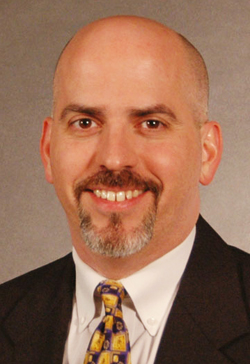Book Explores Culture Of Russian Mafia
 |
Joe Serio |
For followers of crime drama, the word mafia might
produce images of unspeakable violent acts and gun battles
in the streets of major U. S. cities, reminiscent of scenes
from The Godfather movies.
However, there is a different mafia functioning quietly yet
successfully in the United States, and its operations could
possibly be affecting every American either directly or indirectly.
This mafia, driven more by the desire to acquire money rather
than territory, is collectively known as the Russian mafia,
although those involved are from other post-Soviet countries
as well, according to a new book by Joe Serio. Serio, a criminal
justice doctoral student at Sam Houston State University and
project manager in the Correctional Management Institute of
Texas, has spent almost 20 years studying Russian language,
culture and crime.
The book, Investigating the Russian Mafia , is scheduled
to be available April 10. Serio will sign books on
Friday, April 11, from 5:30 to 7:30 p.m. at Fat Boys Restaurant,
located at 1932 Sam Houston Avenue in Huntsville.
Following the book signing, Serio will perform with The Mixed
Review, a musical group with whom he plays the guitar and
harmonica. He taught himself how to play the harmonica
while he lived in Moscow and played for a time with a Russian
rock band.
"Oddly enough, in addition to playing in Moscow clubs I ended
up playing private evenings for KGB agents," Serio said.
"What made it so bizarre was that on the one hand these guys
were slitting throats in Afghanistan in the '80s and now here
they were enjoying my music."
Serio lived in Russia for seven years. He first went
to Russia in 1986 as a tourist. He returned the following
year as a student in a Russian language school in Moscow.
In the early 1990s, he served an internship with the
Soviet police prior to the collapse of the USSR. Later, he
became a security consultant to a global corporate investigation
and business intelligence firm and served as director of the
firm's Moscow office overseeing investigations across the
former Soviet Union.
While studying for his master's degree at the University
of Illinois at Chicago, he was employed to work in the Office
of International Criminal Justice at the university by Richard
Ward, who later came to Sam Houston State University as dean
of the College of Criminal Justice and was recently named
dean of the Henry C. Lee College of Criminal Justice and Forensic
Sciences at the University of New Haven.
Ward was in the process of establishing relationships with
law enforcement personnel around the world. In 1989,
he began a relationship with the Soviet police who sent two
of their top organized crime officials to Chicago to meet
with Ward. They agreed to an exchange program and because
Serio spoke Russian, he was selected to serve an internship
at the Sixth Department for Organized Crime Control under
the Ministry of Internal Affairs in Moscow for a year.
It was during this time that he became interested in the Russian
mafia.
In Investigating the Russian Mafia , Serio discusses
how small cells within the organization have come to the United
States to set up a white-collar version of organized crime.
"The circumstances under which they existed during Communist
domination forced them to become expert manipulators," said
Serio, "and to them, America is a huge cookie jar of opportunities."
Although groups are still involved in crimes such as human,
drug and weapon trafficking, they have become especially good
at crimes of fraud and deception.
"When they first arrive in the United States, they get as
much documentation as they can and make themselves legal,"
Serio said. "They set themselves up in respectable,
legitimate professions then they conduct illegal activities
such as filing false medical insurance claims and staging
automobile accidents."
During his research Serio discovered that according to a
New York state official, every driver in New York pays an
extra $200 a year for the privilege of driving because of
insurance fraud.
"The Russian mafia is at the top of the list for orchestrating
that outcome because of their activities," Serio said.
So that no one is misled by the movie industry portrayal
of the Russian mafia as crime lords only on the East and West
coast of the United States, Serio said that indicators show
they have activity in almost every state, including Texas.
He cites examples in his book of rural border activity
as well as "big city" operations.
He points out that law enforcement officials are concerned
about the organization, but because so much attention has
been directed to Al-Qaeda and terrorism since 9/11, the Russian
mafia hasn't had near the focus that it did during the 1990s.
"The problem with organized crime in the 21 st century is
that these crime groups are starting to consolidate across
the United States," he said. "The Russians are joining
the rest of the criminal world --- not taking over."
Serio said that while writing the book he had several audiences
in mind, including college students and law enforcement officials.
"I hope that not only will it be understandable and enjoyable,
but that it's different from other books about the Russian
mafia in that it explains how the organization developed in
terms of history, culture and economics, as well as why it
has been so successful in the modern world."
—END—
SHSU Media Contact: Julia
May
April 3, 2008
Please send comments, corrections, news tips to Today@Sam.edu.
|








